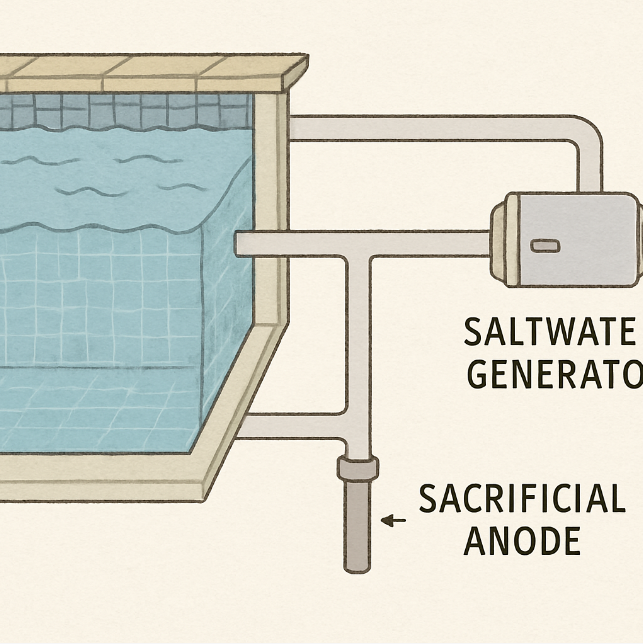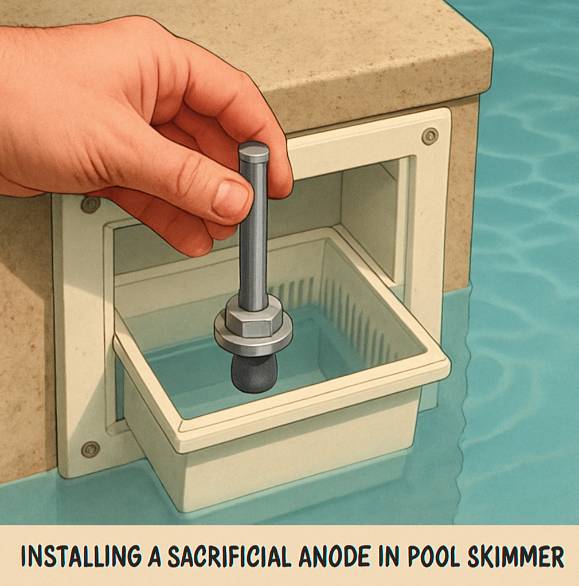Owning a swimming pool is great, but it's more than just cleaning and checking chemicals. Many pool owners often miss a key part: preventing corrosion. This can really affect how long your pool parts last and how safe your pool water safety is. That's where sacrificial anodes for pools come in handy. They're a super important tool for keeping your pool in top shape. In this article, we'll look at why sacrificial anodes for swimming pools are so good, especially for saltwater pools, and how they can make your pool and its parts last much longer.
A pool anode is a special piece of metal designed to wear away instead of other metal parts in your pool system. This process is called "cathodic protection," which is a fancy way of saying it protects metal from rusting. Usually, these anodes are made of zinc anode pool material or magnesium. The sacrificial anode for pool attracts all the stuff that causes rust, letting itself get used up so your important metal pool parts don't. That's why it's called "sacrificial."
Your pool has lots of metal bits, like ladders, lights, pumps, and heaters. All these can rust. This problem is even bigger in saltwater pools because salt makes rust happen faster. By adding a sacrificial anode for saltwater pool to your system, the rust-causing elements go for the anode instead of your crucial metal parts. This acts like a shield, stopping those parts from getting damaged and making them last longer. It also helps your pool run smoothly.
Besides protecting metal, swimming pool sacrificial anodes also help keep your pool looking good. Rusty parts can leave ugly stains and damage, making your pool look bad. By stopping this, anodes help keep your pool clean and inviting, making your swim time much better.
Saltwater pools are popular because they need less cleaning and fewer chemicals than regular chlorine pools. But the salt in them can really speed up metal rust. Putting a sacrificial anode for salt water pool in is super helpful here, as it fights off the rust from the salt, keeping your pool parts strong and working well.

Many pool owners ask: sacrificial anode for pool need to be bonded or not? Bonding means connecting all the metal parts of your pool to make sure they have the same electrical charge. This prevents electric shocks. For pool anodes, proper bonding is key. It makes sure they can protect all metal parts well by helping electricity flow. This connection makes the anode work better, giving full protection against rust for all metal parts in the pool water.
Good bonding doesn't just make sacrificial anodes for pools work better; it also makes your pool water safety much better. Electrical bonding lowers the risk of electrical dangers, making for a safer swimming spot. For pool owners, this means peace of mind, knowing their pool is both well-kept and safe for everyone.
There are different kinds of pool anodes, each made for certain pool setups and needs. Picking the right one ensures the best protection and efficiency.
Zinc anodes are the most common choice for pools. They're great at stopping rust and don't cost too much. They're especially good for saltwater pools, where their protective power is needed most. Because they're affordable and easy to find, zinc anode pool options are a popular pick for many pool owners wanting to make their pool last.
Magnesium anodes are another option. They react more strongly than zinc anodes, which makes them perfect for places where rust isn't as big a problem, like freshwater pools. Their stronger reaction means they quickly protect against possible rust threats. This makes them a good choice for pool owners who want to protect their investment in less harsh environments.
Magnesium anodes can also be used when your pool's water chemistry needs a faster-acting protection method. Knowing what your pool needs can help you decide if magnesium anodes are right for you, offering a custom way to stop rust.
How you install sacrificial anodes for pools depends on your pool's setup. But doing it right is vital for good rust protection.
One of the easiest ways to install a pool anode is to put it in the pool skimmer. This makes sure the anode stays in direct contact with the water, giving constant and effective rust protection for your pool's metal parts. Its easy installation makes this a convenient choice for many pool owners.
For above ground pools, anodes can be put into the pool's plumbing system. This setup ensures the anode is exposed to moving water, protecting all metal parts. This inline installation method can fit different pool designs, giving flexibility for various setups.
Where to put it: Place the sacrificial anode for swimming pool where water flows steadily to get the best protection.
Bonding: Make sure the anode is properly bonded to your pool's metal parts to make it work better. Remember, sacrificial anode for pool need to be bonded or not is a crucial question for effectiveness and safety.
Replacing: Check the anode regularly and replace it when about half of it is gone. This keeps the protection strong.

The main reason to use sacrificial anodes for pools is that they stop rust. By wearing away themselves, these anodes protect your pool's metal parts, making them last much longer and cutting down on how often you need to replace them. This way of preventing rust keeps your pool working well and looking good for years.
While buying and putting in pool anodes costs a bit at first, they save you money in the long run. They cut down on expensive repairs and replacements of rusty parts. This smart maintenance plan lets pool owners spend their money better, focusing on making the swimming experience great instead of constant fixes.
Rust can weaken metal parts, leading to dangers like broken structures or sharp edges. By stopping rust, sacrificial anodes for pools help make your swimming area safer. They protect swimmers from possible injuries and ensure that pool features stay strong and reliable. This directly contributes to pool water safety.
Rust can really mess with how well pool equipment, like pumps and heaters, works. By keeping these parts in good shape, sacrificial anodes for swimming pools help your pool perform its best. This means better water movement, efficient heating, and overall improved function, leading to a more enjoyable swim.
Not having to replace rusty metal parts as often is also good for the environment. By creating less waste and needing fewer new materials, sacrificial anodes for pools help make pool care more sustainable. This eco-friendly choice helps lower the carbon footprint of pool maintenance, fitting in with bigger efforts to be more sustainable.
To get the most out of your sacrificial anodes for pools, add these tips to your pool care routine:
Check often: Look at the anode regularly for signs of rust and replace it when needed to keep protection going.
Watch water chemistry: Keep your water chemicals balanced to reduce rust risks and help the anode work best. This is key for overall pool water safety.
Check bonding: Make sure all metal parts are properly bonded so the pool anode can work well and boost overall safety. This ties back to the question: sacrificial anode for pool need to be bonded or not.
Get help: Think about hiring a pro to install and check sacrificial anodes for pools. They can make sure everything is working right and offer expert advice on pool care.
Sacrificial anodes for swimming pools are a must-have for a complete pool care plan, especially in saltwater pools. By knowing how they work and what they do, pool owners can make smart choices to protect their investment and enjoy a safe, well-kept swimming spot. Whether you're using a zinc anode pool option for a saltwater pool or a magnesium anode for freshwater, the protection these small but mighty devices offer is super valuable. Relax knowing your pool is safe from rust, so you can just enjoy your watery oasis.